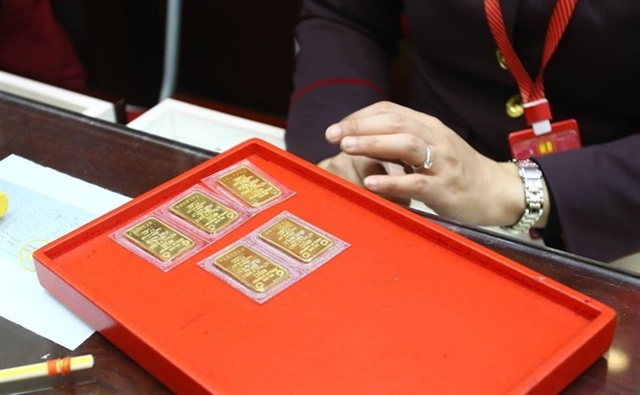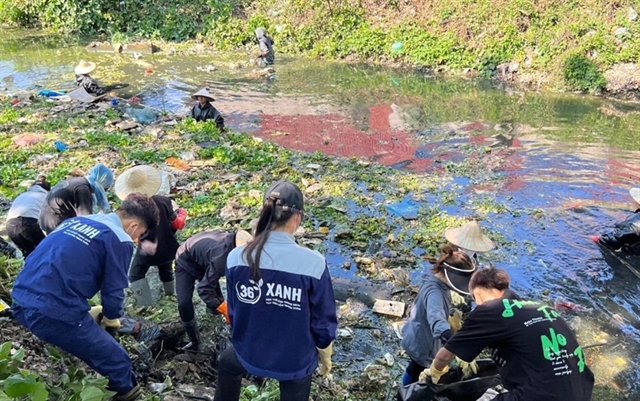 Op-Ed
Op-Ed

I am in deep dudgeon and could not hold back tear after seeing the image of a 10-year-old boy in Hà Nội’s Cầu Giấy District covering with serious injuries released earlier this month.
By Khánh Vân
The images of a badly abused and injured 10-year-old boy in Hà Nội’s Cầu Giấy District, released early this month, shocked the nation.
Doctors said the boy who’d escaped two years of torture, had a fractured skull and four cracked ribs.
The feelings of shock, anguish and anger were magnified when it became known that the serious injuries were inflicted by none other than the boy’s parents – his father and stepmother.
For years, the father and stepmother beat up the child, kept him locked in their rented apartment, starved him and heaped other abuses. They did not even send him to school, depriving the child of another fundamental right.
“They often gave me no food and did not let me go outside to play. I haven’t had a proper meal for two years and there were many nights I had to sleep on the floor with only a thin blanket,” the boy told the media.
The fate of the boy if his plight had not been exposed when it was does not bear imagining.
What should give us grave pause, amidst our despair, is that this is not an isolated case, hence it becomes a very urgent task that we find out why this atrocity happens. The abuse of children by anyone is unacceptable, but when parents do it, it becomes unbearable.
The plight of the boy in Cầu Giấy District was still fresh in the mind when reports surfaced on Wednesday about another boy, in Hà Nội’s Đông Anh District, being beaten by his own father with electric wires for months, leaving him black and blue all over.
Three years ago, a four-year-old girl in Bình Dương Province sustained brain injuries from her parents’ beatings. In the most tragic case, an eight-year-boy in Bắc Ninh Province died in 2014 after being hit by his father.
Where does such inhumanity stem from? This is a question we have to look at seriously.
The first thing that comes to mind is the mindset that normalizes “some” violence against children, the spare-the-rod-and-spoil-the-child outlook that is still quite popular in the country. It seems to be a fair guess that most parents have beaten their children at some time or another, mostly as a disciplining measure, for their own good, of course. And this reasoning also applies to scolding or nagging. It is time that we recognise this as unacceptable abuse that the child does not deserve.
According to research conducted in 2005 by the Population, Family and Children Scientific Institute and Swedish Save the Children, 37 per cent of parents scolded, 29 per cent used corporal punishment, and 20 per cent verbally abused a child if he/she made a mistake.
Several years ago, five children in Thái Bình Province committed suicide and left a note saying that they did not want to live because they were continuously insulted by parents at home and received sarcastic remarks frequently from teachers at schools.
The Ministry of Labour, Invalids and Social Affairs announced in June that the rate of children suffering violence in their homes ranks the highest, at 63.2 per cent, three times that of schools at 20.1 per cent.
According to Government data, more than 2,000 children in Việt Nam suffer serious abuse that requires special help and interventions every year.
The case of the boy in Cầu Giấy District highlights another problem that is rising – divorce. There are enough studies that show the impacts of children when their parents get divorced. Many end up suffering physical abuse in addition to the mental trauma they have to endure for no fault of their own.
Lê Thị Quý, head of the Institute for Gender and Development, has said that there is nowhere in the world that divorces have such a bad, heart-breaking impact on children as in Việt Nam.
Many people consider their former partners “enemies” after getting divorced and the “weapons” they use to hurt others were their own children, she said. In many cases, fathers have vented their anger on their own children, she said. This is not to mention the discrimination that children often suffer at the hands of stepmothers or stepfathers.
Given the constantly increasing divorce rate in Việt Nam over the last two decades of so, child abuse, obvious and subtle, could well become an even more frequent occurrence.
Returning once again to the boy from Cầu Giấy District, his biological mother claimed she only knew about her son’s fate after his abuse was publicised. That a mother has no idea how her son was living for over two years despite living in the same city is difficult to believe. She explained that her ex-husband found many ways to not let her meet her son.
Personally, this is not an acceptable excuse. As the mother of two children, I would not be able to bear not knowing about them for a few hours.
We need to change, as a society. We are a society that values and cherishes children, but we should do much more to protect them. Children who are beaten or excessively controlled at home tend to suffer from greater stress, anxiety and self esteem. Studies have shown that there is a great deal of shame associated with the experience of violence at home.
Besides, violence against children is also believed to sow the seeds of cruelty in them. A high rate of juvenile offenders is often a result of violence at home. According to a survey by the Ministry of Public Security, 50 per cent of children at rehabilitation and reeducation centres have suffered prolonged harsh punishments from parents. Up to 23 per cent of them were beaten by fathers.
It is not a pleasant cliché, but a serious truism that children are our future. As a society, we should adopt a zero-tolerance attitude towards any kind of violence against children. Without this, all the legal steps taken against offending parents will not have much impact.
Every child who is abused is likely to suffer lifelong trauma, despite all the love she or he might receive after the abuse stops.
It is simply time to spare the rod forever and ever. — VNS









.jpg)